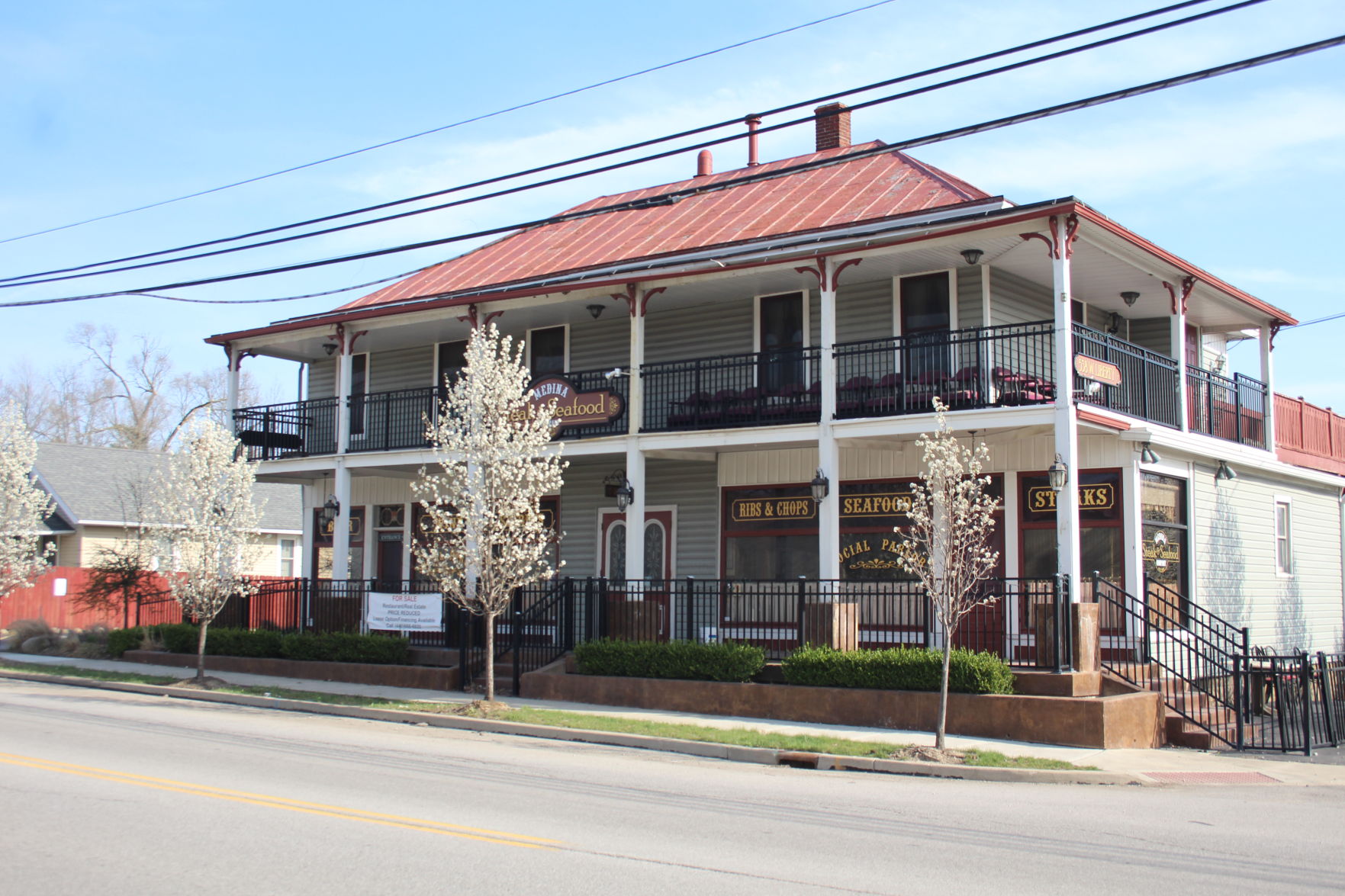Restaurant, recovery offered under one roof
Robby’s Voice creator opposed to selling spirits; considers looking for new space for recovery services

The old Medina Steakhouse and Seafood Restaurant will get new life as a French restaurant. File photo

Chef Brandon Chrostowski hopes to duplicate his award-winning restaurant and rehabilitation program in the former Medina Steakhouse which now houses the Medina County Recovery Center. Photos by GLENN WOJCIAK

Chief Probation Officer Veronica Perry (left) and Judge Joyce Kimbler talk with General Manager Michael Flaherty about plans to open an upscale restaurant and culinary training program in the Medina County Recovery Center.
MEDINA – County officials have announced plans to convert the Medina County Recovery Center into a culinary school and restaurant called Serenite that could open in the former Medina Steakhouse in early spring.
The facility opened last summer as Robby’s Recovery Center for adults coping with addictions to drugs and alcohol and was greeted with protests from some neighbors who thought that type of service should not be located so close to a residential neighborhood.
The new plan to reopen the building as a restaurant has also been greeted with protests, this time from governing board member Rob Brandt, who is opposed to serving alcohol in a restaurant associated with a recovery center.
However, Judges Joyce Kimbler and Chris Collier only expressed enthusiasm for the new culinary school and restaurant which is being designed by Brandon Chrostowski, a renowned chef who has worked in Paris, Chicago and New York and founded Edwin’s Leadership and Restaurant Institute in Shaker Heights in 2007.
Edwin’s hires and trains people released from prison and is considered a model for rehabilitation and providing people a second chance, according to Veronica Perry, Medina County’s Chief Probation Officer.
“I’m thrilled he’s here,” said Collier, who introduced the drug court to Medina County 15 years ago. “We hoped that he would just give us some advice on what to do here and he offered to design the program himself.”
Chrostowski said his goal is to provide a new model for recovery which offers people who want to change a second chance to succeed.
The program is now recruiting 12 students for the initial culinary class to be offered at the Recovery Center. They will take part in an eight-month course under the direction of French Chef Gilbert Brenot where they will learn all aspects of the restaurant business including training on wine and spirits.
Chrostowski said food service training is especially valuable in our current culture, which has more people than ever choosing to eat in restaurants. He cited a recent study which indicated for the first time Americans spent more money in restaurants than they did in grocery stores.
Collier said the new program will offer first-class training and prepare graduates for jobs in good restaurants where they will inevitably have to confront alcohol sales even if they are recovering alcoholics.
Kimbler added that abstinence isn’t the only challenge for recovering addicts. They also need support and human relations skills that they can still get through other programs offered at the recovery center.
Brandt does not appear appeased by those arguments, however. “While the restaurant will provide job training, and will have a non-drinking section, we have very firm beliefs opposed to the presence of alcohol as part of a recovery center,” he wrote in a Facebook post. “There are discussions and efforts underway to look for space outside of the restaurant to house meetings and activities, but as of today, that is not in place.”
Brandt is the creator of Robby’s Voice, a nonprofit dedicated to breaking the cycle of addiction for victims like his own son who died of an overdose in 2011. Robby’s Voice lent its name and experience into getting the Medina County Recovery Center up and running last fall but Brandt said he has withdrawn from the management team and the governing board.
The recovery center has had 4,000 registered visitors in its first six months of operation and hosts 20 weekly support groups and meetings, according to its current director, Stefanie Robinson.
Kimbler said there should be no shortage of prospective students for the culinary classes since more than 1,100 indictments were handed down in county courts last year, about 80 percent of them for defendants who had drug issues that contributed to their crimes.
The facility opened last summer as Robby’s Recovery Center for adults coping with addictions to drugs and alcohol and was greeted with protests from some neighbors who thought that type of service should not be located so close to a residential neighborhood.
The new plan to reopen the building as a restaurant has also been greeted with protests, this time from governing board member Rob Brandt, who is opposed to serving alcohol in a restaurant associated with a recovery center.
However, Judges Joyce Kimbler and Chris Collier only expressed enthusiasm for the new culinary school and restaurant which is being designed by Brandon Chrostowski, a renowned chef who has worked in Paris, Chicago and New York and founded Edwin’s Leadership and Restaurant Institute in Shaker Heights in 2007.
Edwin’s hires and trains people released from prison and is considered a model for rehabilitation and providing people a second chance, according to Veronica Perry, Medina County’s Chief Probation Officer.
“I’m thrilled he’s here,” said Collier, who introduced the drug court to Medina County 15 years ago. “We hoped that he would just give us some advice on what to do here and he offered to design the program himself.”
Chrostowski said his goal is to provide a new model for recovery which offers people who want to change a second chance to succeed.
The program is now recruiting 12 students for the initial culinary class to be offered at the Recovery Center. They will take part in an eight-month course under the direction of French Chef Gilbert Brenot where they will learn all aspects of the restaurant business including training on wine and spirits.
Chrostowski said food service training is especially valuable in our current culture, which has more people than ever choosing to eat in restaurants. He cited a recent study which indicated for the first time Americans spent more money in restaurants than they did in grocery stores.
Collier said the new program will offer first-class training and prepare graduates for jobs in good restaurants where they will inevitably have to confront alcohol sales even if they are recovering alcoholics.
Kimbler added that abstinence isn’t the only challenge for recovering addicts. They also need support and human relations skills that they can still get through other programs offered at the recovery center.
Brandt does not appear appeased by those arguments, however. “While the restaurant will provide job training, and will have a non-drinking section, we have very firm beliefs opposed to the presence of alcohol as part of a recovery center,” he wrote in a Facebook post. “There are discussions and efforts underway to look for space outside of the restaurant to house meetings and activities, but as of today, that is not in place.”
Brandt is the creator of Robby’s Voice, a nonprofit dedicated to breaking the cycle of addiction for victims like his own son who died of an overdose in 2011. Robby’s Voice lent its name and experience into getting the Medina County Recovery Center up and running last fall but Brandt said he has withdrawn from the management team and the governing board.
The recovery center has had 4,000 registered visitors in its first six months of operation and hosts 20 weekly support groups and meetings, according to its current director, Stefanie Robinson.
Kimbler said there should be no shortage of prospective students for the culinary classes since more than 1,100 indictments were handed down in county courts last year, about 80 percent of them for defendants who had drug issues that contributed to their crimes.



